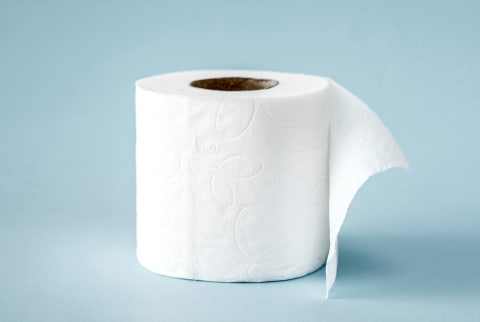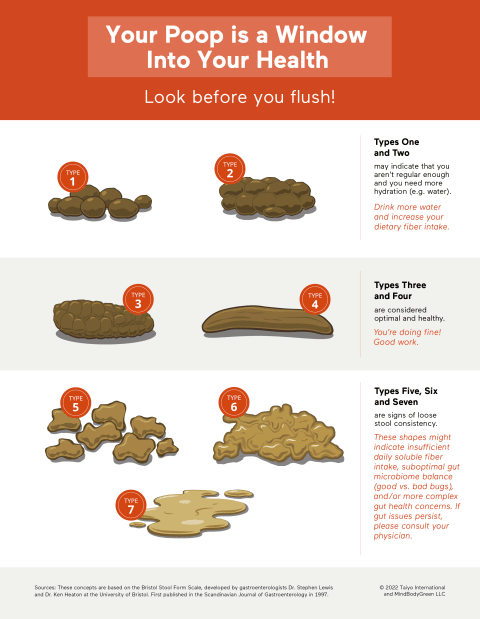When it comes to color, a shade of brown is optimal. To determine if the size and shape of your poop are ideal, you can consult the science-based scale and gold standard for monitoring the stool spectrum: the Bristol Stool Chart. (Of course, this requires you to actually look before you flush). This stool scale breaks forms down into seven different types of poop: While they can be startling, nutrient-related color changes in our stool (like red stool appearing after a beet salad or black stool when taking iron supplements) are considered normal. That said, any color outside of brown—including red, green, yellow, white, and black—can potentially indicate a more serious health issue and may be cause for concern and follow-up with a health care provider. Failing to hydrate properly can lead to infrequent bowel movements, which often come in the form of types 1 and 2. On the other hand, pooping too frequently and seeing types 5, 6, and 7 in the toilet bowl most of the time can indicate suboptimal gut health. Interestingly, both sides of the scale (i.e., hard pebbles you strain to pass and too-frequent loose stools) can demonstrate a need for more fiber in your diet. Insoluble fiber helps build stool bulk and supports motility by speeding up gut transit time. It’s important to include both types of fiber in your diet via a variety of fiber-rich plant sources. Since 95% of Americans are failing to meet our daily fiber needs (and by a wide margin), a quality supplement with organic plant fibers is a simple and effective way to bridge that fiber gap. When choosing a fiber supplement, integrative registered dietitian Whitney Crouch, RDN, CLT, recommends starting your search with your specific poop health goal in mind. “There are a few different types of fiber supplements available, so knowing your goal with using a supplement is important. Decide if you need more bulk or softer stools,” she says. From there, you can narrow down your search. “Trying to bulk up and improve regularity? Try a psyllium, guar bean, or methylcellulose product,” Crouch says. If you have specific GI health concerns, Crouch recommends limiting or avoiding FODMAPs like fructooligosaccharides (FOS). A premium daily fiber supplement that features soluble and insoluble plant fibers, like mindbodygreen’s organic fiber potency+, is a smart way to promote healthy digestion, gut motility, stool form, and regularity.* RELATED: How To Poop Better & Easier: 11 Natural Remedies To Try At Home Adding more fiber to your nutrition ritual—with a plant-plentiful dietary approach and a quality supplement, like mbg’s organic fiber potency+—can help support healthy bowel movements, keep things moving along, and help your gut microbiome thrive.*




